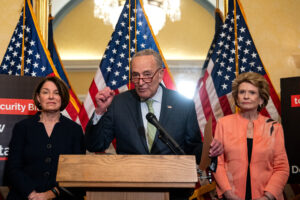15:30
Brief
WASHINGTON — Any last hopes of resurrecting the expanded child tax credit as part of Congress’s massive spending package were dashed early Tuesday when the 4,155-page bill was released without a mention of the tax benefit.
The temporary expanded child tax credit, part of a COVID-19 relief deal in 2021, allowed more low-income families, including those with no income at all, to claim up to $3,600 for each child up to age 6, and up to $3,000 per child ages 6 to 17. For the first time, families received the funds in monthly installments.
Democrats had hoped to partially restore the anti-poverty measure by including it in the $1.7 trillion bill that will fund the government for the remainder of the fiscal year.
One idea floated, but never solidified: Democrats wanted to enhance the child tax credit in exchange for reviving a research and development corporate tax deduction that had been reduced under the Trump administration’s 2017 tax overhaul.
In recent weeks, the White House quietly signaled it also would be open to attaching a work requirement to the child tax credit.
“But over the last few weeks, Republican leaders in Washington refused to even discuss a deal that would benefit America’s kids and businesses,” Sen. Michael Bennet, D-Colo., said in a statement Tuesday.
However, observers of recent tax debates point out that Democrats were already in favor of restoring the R&D tax break —- separate and apart from a child tax credit expansion.
Still, Bennet maintained that the GOP “decided to send a lump of coal to America’s children this year.”
Last month, GOP members warned against permanently restoring the child tax credit to 2021 levels, saying the increase could cost taxpayers roughly $1.4 trillion over the next decade, according to a Joint Committee on Taxation report.
Proponents of permanently expanding the benefit point to U.S. Census Bureau data and analyses by the D.C.-based Tax Policy Center that food insecurity and other poverty markers decreased for low-income families who received the monthly payments in 2021.
Bennet, along with Democratic Sens. Sherrod Brown of Ohio and Cory Booker of New Jersey, and Reps. Rosa DeLauro, D-Conn., Suzan DelBene, D-Wash., and Ritchie Torres, D-N.Y., made up the core group of lawmakers pushing for the low-income tax benefit.
“I am extremely disappointed that we were not able to extend the Child Tax Credit in this year’s government funding bill. I remain committed to the position I took earlier this year: there can be no R&D without the CTC,” DeLauro, House Appropriations Chair, said in a statement. “I hoped our Republican colleagues would understand how important the Child Tax Credit is to the financial stability of American families, but that has not come to pass.”
Democrats tried last year to extend the enhanced benefits into 2022 when they made the policy a centerpiece of the Build Back Better reconciliation package. Sen. Joe Manchin, D-W.Va., declined to support the proposal, citing concerns about inflation.
Families who meet certain income levels in 2022 will see a return to previous child tax credit levels — roughly $2,000 per child. Those who made $2,500 or less this past year will receive a partial refund or no benefit at all.
Roughly 19 million children will no longer be eligible for the full credit in 2022, according to the Tax Policy Center, a collaboration of the Urban Institute and the Brookings Institution.
The child tax credit has been around since 1998, and has been expanded numerous times.
Our stories may be republished online or in print under Creative Commons license CC BY-NC-ND 4.0. We ask that you edit only for style or to shorten, provide proper attribution and link to our website. AP and Getty images may not be republished. Please see our republishing guidelines for use of any other photos and graphics.




